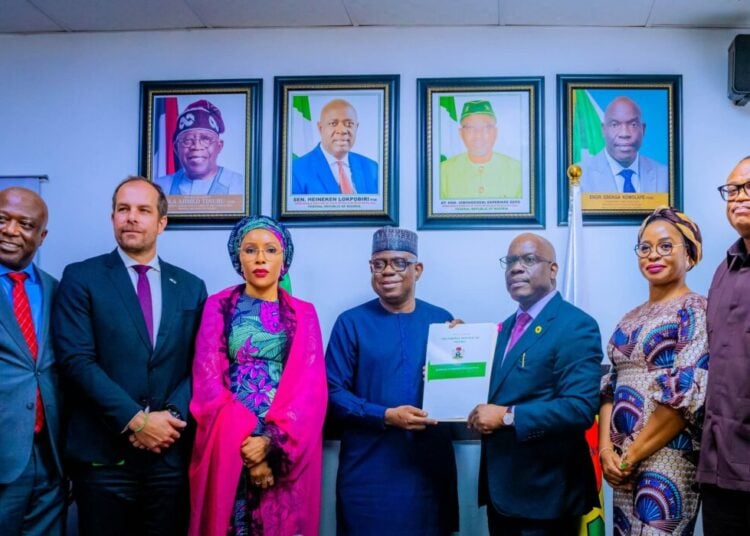The Nigerian Upstream Petroleum Regulatory Commission (NUPRC) has concluded the execution of a Production Sharing Contract (PSC) with Nigerian National Petroleum Company Limited (NNPCL) and TotalEnergies/South Atlantic Petroleum (Sapetro) for two offshore Petroleum Prospecting Licences (PPLs) 2000 and 2001.
They were awarded through the 2024 Licensing Round.
The signing ceremony held in Abuja signals the start of deepwater exploration covering over 2,000 square kilometres in the Niger Delta Basin. The project is expected to boost the nation’s oil production to achieve its target of three million barrels per day (mbpd).
Delivering the keynote address, the chief executive of NUPRC, Engr. Gbenga Komolafe, described the signing as more than a ceremonial event, calling it a pivotal moment for the sector and the economy.
Komolafe described the signing as “more than a ceremonial event; it is about laying the foundation for a future of energy security, investment inflow, and shared prosperity.”
He emphasised that the PSC signing “reaffirms that Nigeria is open for business, ready for investment, and committed to leadership in the global energy space.”
The CCE highlighted the transparent and competitive bidding process that led to the award of these offshore blocks, stating, “TotalEnergies, holding an 80 per cent interest, and Sapetro, with 20 per cent, emerged successful in what we called a fair, transparent, and competitive bidding process in line with Section 73 of the Petroleum Industry Act (PIA) 2021.”
He acknowledged the companies’ longstanding presence in Nigeria.
“TotalEnergies has been operating in Nigeria for over 60 years, while Sapetro has 30 years of experience here,” he said.
The PSC’s terms reflect the reform-driven framework of the PIA and include a signature bonus of $10 million and production bonuses linked to commercial milestones, such as the production of two million barrels and bonuses on the attainment of 35 million and 100 million barrels.
Komolafe explained, “These terms provide certainty for investors, fairness for the Federation, and clarity for all parties involved.”
“Nigeria’s target of increasing crude oil output to about 3 million barrels per day is a key focus.
“We expect swift and technically sound exploration leading to early Final Investment Decisions,” urging the consortium to “deepen local content, create quality jobs, and empower Nigerian businesses,” he said.
Komolafe praised President Bola Tinubu’s transformative leadership and decisive reforms in the sector. “The bold initiatives and reforms championed by President Tinubu have repositioned Nigeria as a viable investment destination.
Executive Orders 40, 41, and 42 on fiscal incentives, local content enhancement, and contract efficiency, respectively, have played critical roles in creating an enabling environment for investors,” Komolafe said.
The group chief executive officer of NNPC Limited, Bashir Ojulari, also spoke on the importance of the PSC.
“This PSC is a major milestone that speaks to our commitment to the provisions of the PIA and will bring NNPC Limited closer to achieving the 3 million barrels per day target and securing an additional $60 million investment by 2030,” he said.
He underscored the contract’s comprehensive coverage.
“It includes robust gas terms designed to incentivise monetisation of non-associated gas, aligning with Nigeria’s gas commercialisation objectives,” he said.
TotalEnergies’ managing director, Mathieu Bouyer, reaffirmed the company’s commitment, stating, “TotalEnergies, with a presence in Nigeria for over 60 years, is fully committed to progressing swiftly and responsibly with the agreed work programme. We are actively working to spud the first well on these blocks in the shortest possible timeframe.”
He emphasised the partnership’s goal.
“We aim to deliver results that benefit all stakeholders, reinforce Nigerian content, create jobs, and generate value for Nigeria and its people,” he said.
The PSC execution represents a new era for Nigeria’s oil industry, with clear targets to boost production sustainably, attract investment, and position Nigeria strategically in the global energy market.











